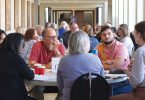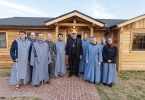
Father Oswaldo Sandoval, coordinator for Johnson County Hispanic ministry, gives a presentation at the archdiocesan convocation Oct. 13 at Savior Pastoral Center in Kansas City, Kansas. More than 300 archdiocesan leaders gathered at the biennial convocation, the theme of which was “Living as Missionary Disciples.” LEAVEN PHOTO BY JOE BOLLIG
by Joe Bollig
joe.bollig@theleaven.org
KANSAS CITY, Kan. — They didn’t start the fire, but they did carry it back from Orlando, Florida.
Fired up by their experience at the national Convocation of Catholic Leaders July 1-4 in Orlando, Archbishop Joseph F. Naumann and other delegates resolved to carry home a spark to the Archdiocese of Kansas City in Kansas.
The vision of Orlando was shared at the Archdiocesan Convocation of Parish Ministries 2017: “Living as Missionary Disciples,” held Oct. 13 at the Archbishop James P. Keleher Center at the Savior Pastoral Center in Kansas City, Kansas.
More than 300 archdiocesan leaders gathered at the biennial archdiocesan convocation for lively presentations and participant interaction in panel discussions during sessions.
“[The Orlando convocation] was all a reflection on [Pope Francis’ apostolic exhortation] ‘The Joy of the Gospel’ and how we form missionary disciples,” said Archbishop Naumann.
“When we left Orlando, we were tasked with being delegates back to our own communities,” said Emily Lopez, lead consultant for adult evangelization in the archdiocese.
Even the format of the Orlando convocation was replicated at the archdiocesan convocation, both in look and in method.
The usual speaker’s podium on stage was replaced by chairs and a couch, where the emcee and a panel sat as they each took turns speaking on their session’s topic.
A phone number was flashed on a large screen so people could text questions on their cellphones to the panelists during Q&A periods.
“What we did was a direct reflection of what we experienced while we were in Orlando,” said Lopez, who was emcee for the archdiocesan convocation.
“The three main topics and panels were the same, and even the layout of the room,” she continued. “We intentionally wanted to have an environment that fostered conversation — not just attention to a presentation — that really invited people into a conversation.
“We wanted everyone to feel they were in a place where they were involved.”
Three big topics — plus two
The three session topics carried over from Orlando were “Charting the Mission Field,” “Call to Missionary Discipleship” and “Going to the Peripheries.” Organizers of the archdiocesan convocation also added two more, “Practical Strategies” and “Equipped for Excellence.”
In “Charting the Missionary Field,” archdiocesan vicar general Father Gary Pennings gave an overview of the “landscape” or mission field of the United States. He presented data about the demographic, geographical and cultural shifts the Catholic Church and the nation are experiencing.
He noted that over the past 50 years, Catholicism in America has experienced its largest cultural and demographic transformation since the large European migrations of the 19th and early 20th centuries.
One transformation is that Hispanics account for 71 percent of the growth of Catholic population in the United States since 1960, and approximately 60 percent of the Catholics in the nation under the age of 18 are Hispanic.
Father Pennings also noted four major cultural shifts.
First, marriage and family life has been significantly reconfigured in terms of roles, expectations and practices. Second, communal life has been eroded. Third, society has become polarized to the point that respectful and mutual dialogue is almost impossible. Fourth, increased secularization has led generations of young Catholics out of the church.
“We have to see these challenges . . . as opportunities that call us to discern the new paths for the church that Pope Francis talks about in his first lines of ‘The Joy of the Gospel,’” said Father Pennings.
“We have to move from ‘maintenance’ to ‘mission,’ but even beyond that — to a permanent state of mission.”
In his presentation during the session “Call to Missionary Discipleship,” Father Nick Blaha, chaplain of the Didde Catholic Campus Center in Emporia, said, “We cannot leave things as they presently are. Mere administration is not enough.”
Rather than yielding to discouragement, Pope Francis is calling Catholics to a simple truth: We must build a culture of encounter in our churches to reach those of the millennial generation who are mistrustful of authority. We forget that we can come across as not so much ‘I want to love you and I have truth to share,’ but ‘I want to change you,’” he said.
“We need to be a church capable of walking at people’s side, to more than just listen to them, but to help them make sense of the life they live and to interpret the larger picture,” he said. “Do we want to become a church capable of inflaming people’s hearts?”
In the session “Going to the Peripheries,” Katie Locus, archdiocesan consultant for deaf ministry, talked about the barriers deaf people experience in the church.
“You might be thinking . . . I don’t see deaf people in my church or waiting in line at my confessional,” said Locus through an interpreter.
There are two reasons, she said. One is that deaf people tend to be quiet. Two is that they’ve already left.
Think about the other persons on the peripheries of the church, she said. Why aren’t they involved with the church? They each have their own reasons.
“How are we going to know those reasons?” said Locus. “We have to start a conversation. How do we start that conversation? Should we expect them to come to us assertively and ask? They already have a bias and fear — whatever their reason is against the church.
“So what do we do?” she asked. “The responsibility is really on each one of us to meet them where they are and talk to them. This means we have to get out of our comfort zone, to go out of the walls of the church.”
The work is just beginning
The ending of the archdiocesan convocation was not really the end, but a beginning — the beginning of building a culture of evangelization in our parishes and the raising up of missionary disciples.
“Multiple times we referenced [that]it was the beginning of a conversation we expect them to continue in the parishes,” said Lopez. “Much of our job, especially in the [archdiocesan ministries] is to support the work of the parishes. . . . The idea of what we’re sharing with them needs to be an occasion for continued conversation and action, especially building toward 2019.”
The archdiocese is already planning an even bigger convocation of missionary disciples tentatively scheduled for Oct. 4-5, 2019.
“This [convocation] is the hors d’oeuvre for what we do in two years on a bigger scale to reach more people,” said Archbishop Naumann. “We think these events can help advance this effort to create a culture of evangelization by inspiring, motivating and educating parish leaders.
“That’s were this culture has to be really imbedded — in our parish communities.”






